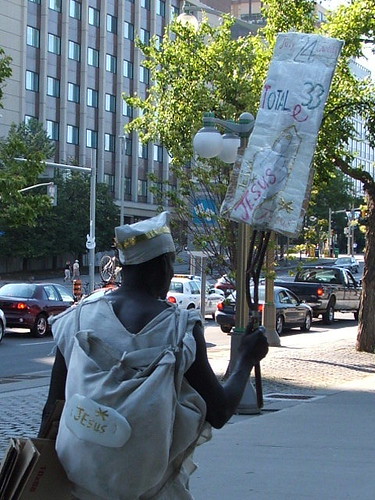UPDATED Wednesday at 7:20 a.m.
I think the following post conveys an important message, but I didn't succeed in bringing it out. Hence the update.
When I chose the title for the post, "When God commands an immoral act," I was thinking of current geopolitical events. I was thinking of the terrorist acts which are carried out in the name of Allah.
The rest of us — those who don't share the terrorists' ideology — find the rationale incomprehensible.
How could God command the slaughter of innocent men, women, and children?, we wonder.
How could a holy God will what is plainly an immoral act?And the problem is not limited to Muslims. Within the Christian community, "pro-life" believers who murder abortionists are in approximately the same position.
I have placed "pro-life" in quotation marks because anyone who carries out a murder has effectively renounced their membership in the truly pro-life community. And, to be fair, this is a very tiny fringe group which is condemned unequivocally and universally within the mainstream Christian community. Nonetheless, the problem is the same. The extremists kill in the name of Jesus.
Which brings us to the text in Genesis 22, where God commands Abraham to kill Isaac. If the text is taken at face value, it says that God wills the death of an innocent child. (Though someone will no doubt point out that God doesn't actually will it, and stops Abraham before he carries out the execution. More on this point below.)
In the end, I pulled my punches, and I suspect I failed to make my point. Now that I've added this introduction, I will allow the reader to draw his or her own conclusions.
The subject has a broader application, but the connection to current geopolitical events was in my mind as I was writing.
Q
Yesterday, the pastor of the church I attend did something radical. He challenged the traditional interpretation of Genesis 22.
(OK, maybe it doesn't seem so radical. But believe me, it's radical coming from the pastor of a conservative church.)
Genesis 22 is a passage that presents profound moral problems. God commands Abraham to kill his son. God commands Abraham to commit an immoral act. Clearly, Brent (the pastor) has been wrestling with the moral problems raised by the passage.
I don't know precisely what Brent believes with respect to the inerrancy of scripture. But he isn't so liberal that he can just dismiss the passage as a big mistake, an immoral text, a text that misrepresents God and cannot possibly edify the Church.
Brent believes that all of scripture is good; but he did feel compelled to challenge the traditional interpretation of the text. According to the traditional interpretation, Abraham did a good thing when he set out to kill Isaac in obedience to God's command.
After these things God tested Abraham and said to him, "Abraham!"
"Here I am," he answered.
"Take your son," He said, "your only son Isaac, whom you love, go to the land of Moriah, and offer him there as a burnt offering on one of the mountains I will tell you about."
So early in the morning Abraham got up, saddled his donkey, and took with him two of his young men and his son Isaac. He split wood for a burnt offering and set out to go to the place God had told him about.
On the third day Abraham looked up and saw the place in the distance. Then Abraham said to his young men, "Stay here with the donkey. The boy and I will go over there to worship; then we'll come back to you."
Abraham took the wood for the burnt offering and laid it on his son Isaac. In his hand he took the fire and the sacrificial knife, and the two of them walked on together.
Then Isaac spoke to his father Abraham and said, "My father."
And he replied, "Here I am, my son."
Isaac said, "The fire and the wood are here, but where is the lamb for the burnt offering?"
Abraham answered, "God Himself will provide the lamb for the burnt offering, my son." Then the two of them walked on together.
When they arrived at the place that God had told him about, Abraham built the altar there and arranged the wood. He bound his son Isaac and placed him on the altar, on top of the wood. Then Abraham reached out and took the knife to slaughter his son.
But the Angel of the Lord called to him from heaven and said, "Abraham, Abraham!"
He replied, "Here I am."
Then He said, "Do not lay a hand on the boy or do anything to him. For now I know that you fear God, since you have not withheld your only son from Me."
Abraham looked up and saw a ram caught by its horns in the thicket. So Abraham went and took the ram and offered it as a burnt offering in place of his son. And Abraham named that place The Lord Will Provide, so today it is said: "It will be provided on the Lord's mountain."
Then the Angel of the Lord called to Abraham a second time from heaven and said, "By Myself I have sworn, says the Lord: Because you have done this thing and have not withheld your only son, I will indeed bless you and make your offspring as numerous as the stars in the sky and the sand on the seashore. Your offspring will possess the gates of their enemies. And all the nations of the earth will be blessed by your offspring because you have obeyed My command."
[translation: the Holman Christian Standard Bible]
This is a very disturbing story. How could a holy God command anyone to commit an unholy act? If God does command such an act, does it become holy merely because God commanded it? How could Abraham meekly agree to obey such a command?
Faithful Christians and Jews will quickly emphasize that God stopped Abraham before he killed Isaac. But this doesn't eliminate the moral difficulties.
Look at the event from Isaac's perspective. With no warning, his father seized him. Presumably Isaac cried out and struggled, but was overmastered by his father. Abraham then tied him up, laid him on the altar, and picked up a knife to kill him. God stopped Abraham in time, it's true; but there is no doubt what he intended to do.
Millions of people in the western world have suffered abuse — physical, sexual, psychological — carried out by a father, a mother, a teacher, a priest, or some other authority figure. When they read this passage, they will identify with Isaac in his abject terror.
To his credit, Brent faced these difficulties squarely. His response was to challenge the surface meaning of the text.
(I should point out that Brent's interpretation owes a great deal to a book by Leonard Sweet,
Out of the Question … Into the Mystery.)
On the face of it, the text is unequivocal: Abraham did a good thing. He was right to obey; God blessed him for it, and it was no small blessing!
In fact, Abraham is remembered and lauded for his conduct on this occasion, more than for any other event of his life. Abraham's example became the model of faithful obedience for all subsequent believers. In Christian theology, this story is regarded as prefiguring the Gospel: Abraham was prepared to offer up Isaac, his only and beloved son (see verse 2); and God did something parallel when he offered up Jesus.
But did Abraham, in fact, do a good thing — despite all of the moral problems we summarized above? Brent called the traditional interpretation into question, based on the following considerations:
- God never spoke to Abraham again after this occasion. Even on this occasion, after Abraham picked up the knife, God spoke only through an intermediary (an angel).
- Nor did Isaac ever speak to Abraham again. The only subsequent interaction between Abraham and Isaac was conducted through an intermediary (Gen. 24). When Isaac's mother died, Isaac and Abraham did not comfort one another (Gen. 23:2 and 24:67).
- The nation of Israel was not named after Abraham, contrary to what we might have expected. Abraham is told that he will become a great nation (Gen. 18:18); but the nation is named after his grandson, Jacob (aka Israel).
In other words, Brent argued, God wasn't as pleased with Abraham as a surface reading of the text would lead us to believe.
Brent (following Leonard Sweet) argued that God does not want us to be blindly obedient. God wants a relationship with us. And relationships involve a healthy give-and-take; friendships, by definition, are bilateral, not unilateral.
Abraham understood this principle. When God set out to destroy Sodom and Gomorrah, Abraham disputed and negotiated with God (Gen. 18:22ff.). How could he fail to do the same thing when God commanded him to murder Isaac? Brent pointed out that there were lots of things Abraham could have said to God:
- This can't be your will, Lord — it's contrary to everything I know of your character.
- If this is really your will, confirm it by presenting me with an unmistakable sign.
- You will break my heart, and the heart of Isaac's mother, if you insist that I kill him.
- It will bring your holy name into disrepute if I carry out this command.
- Take my life, Lord, but spare Isaac.
But Abraham just said, "OK". And he set out to obey the command.
According to Brent, this was a two-part test. Abraham passed the easy part, the multiple choice part of the examination: he was obedient to God's command. But Abraham failed the more rigorous part of the examination, the essay question: he forgot that God wants friends who walk in relationship with him, not slaves who obey uncritically.
So far I've told you what Brent argued. But what do I think? Strictly in terms of exegesis (the formal methodology for interpreting written texts), Brent's exposition is suspect. His argument is based almost entirely on silence: that is, it is based on what is missing from the text.
For example, Genesis doesn't record that Abraham argued with God; but maybe he did. Maybe Abraham argued until he was blue in the face, but God was resolute in his demand. And maybe the author of Genesis thought that Abraham's initial resistence decreased the impact of the story — it made him appear less than 100% obedient — so he didn't write it down.
But, in fact, Brent's case is stronger than that. The argument from silence is offered in support of an argument based on principle. The principle is, God is holy; God does not command people to commit immoral acts. This command, the command to offer a human sacrifice, runs contrary to what we know of God's character from elsewhere in the Bible. So it is legitimate to raise questions about the text. It is legitimate to present an argument from silence in support of the greater principle.
I am more liberal in my views. I might argue that the whole story is a myth, to teach the people of Israel that human sacrifice is not pleasing to God. I would certainly point out the cultural context: that neighbouring religions offered human sacrifices, so Abraham might have been under a misconception; and that children were viewed as mere chattel in this era. I would distance myself from the concluding portion of the text, and seek to draw a more appropriate lesson from the story (just as Brent did).
Mostly I want to commend the example set by my pastor. He is not captive to his evangelical presuppositions. He is still able to see moral difficulties for what they are, even if they arise from a biblical passage. While maintaining a biblical faith, he is also attempting to practice a rational and compassionate faith.
I am a liberal, and evangelicals often offend me. But the problem is not with evangelicalism, per se. It is possible to be biblical, rational, and compassionate, all at the same time.
All believers need to embrace this ideal: evangelical and liberal Christians alike; Jews, Muslims, Sikhs — people of all faiths.
And non-believers — secular humanists et al. — need to hold believers to this standard, instead of merely attacking their faith.














